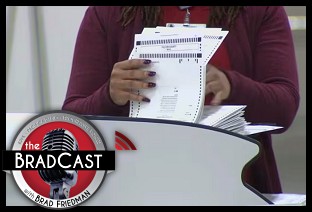 Before their recess for the July 4th holiday, the U.S. House rejected what has, for decades, been largely a no-brainer for the United States Congress: the federal farm subsidies bill.
Before their recess for the July 4th holiday, the U.S. House rejected what has, for decades, been largely a no-brainer for the United States Congress: the federal farm subsidies bill.
This year, however, with a Congress as dysfunctional as it has ever been, even that legislative "gimme" has been stymied, for now, by the far Right Republican caucus hoping to slash even more of the food stamp benefits included the bill, and by progressive Democrats furious about cuts to the federal food assistance program that the GOP-controlled House already managed to write into it.
Before the break, the bill was defeated by a 195 to 234 vote margin in what served as a humiliating embarrassment for House Speaker John Boehner. But the $939 billion bill --- which includes both subsidies to farmers (mostly to "Big Ag") and federal food stamp program appropriations --- will soon be coming back, whether Boehner likes it or not.
And, before its return, the hypocrisy embedded in the "Tea Party" caucus' opposition to the bill needs to be highlighted. That hypocrisy is almost certainly best exemplified by one Rep. Stephen Fincher (R-TN).
Even the ordinarily staid New York Times was taken aback by the level of Fincher's hypocrisy that emerged when he quoted the Bible as justification for slashing food stamp benefits for the poor. He claims that assistance, somehow, amount to theft.
But the facts of Fincher's argument are even more embarrassing than that. The Times notes that Fincher himself has "collected nearly $3.5 million in subsidies from 1999 to 2012" in federal support for his 3,000 acre family farm.
"In 2012 alone, the data shows, Mr. Fincher received about $70,000 in direct payments, money that is given to farmers and farmland owners, even if they do not grow crops."
Even more remarkably, his argument in favor of cutting $20 billion in food stamps came during a debate over the bill in a U.S. House sub-committee which voted to increase subsidies to farmers by $9 billion in the wake of last year's record drought. That, of course, was before the reality of his own reliance on federal funding for his family farm was brought to light by the media...
"We have to remember there is not a big printing press in Washington that continually prints money over and over," Mr. Fincher said during the debate. "This is other people’s money that Washington is appropriating and spending."
When later called out by the media for accepting millions in federal subsidies, even while using the bible to call for slashing aid to children, the disabled and the elderly, among others, Fincher, a "Tea Party" favorite, used some sleight of hand to (sort of) deny the charges.
Tennessee's Commercial Appeal quoted his rebuttal this way:
Actually, The New York Times and other national media understated the size of Fincher's government largesse. In addition to the $3.5 million in federal farm subsidies he personally received, Fincher applied for and received a $13,650 grant from the TN Department of Agriculture --- a grant which was subsequently the subject of a "state inquiry because the [farm equipment] purchased with it was reported sold by Fincher within three years of purchase, potentially a violation of the grant's requirements." Fincher's father also "received a $13,650 grant under the same program in...2009."
According to Wikipedia (citing Politics Daily, the Memphis Commercial Appeal and Washinton Post), Fincher is a seventh generation family farmer and the managing partner of Fincher Farms. "The company has received $8.9 million in farm subsidies over the past decade."
At present, the bulk of farm subsidies, the product of New Deal era legislation originally designed to stabilize agricultural prices and to prevent the bankruptcy of small family farmers during times of economic distress, go to the huge agricultural conglomerations. Where the Fincher family is basking in government-supplied largesse, 80% of farmers receive annual subsidies of less than $5,000.
In fact, there are cases where significant subsidies have been received by those who are not even in the business of farming. Consider the case of investment broker Charles Scwab, who, as reported by Jim Hightower in the aptly named Thieves in High Places, is the proud owner of Casa de Patos, "1,500 acres of picturesque wetlands in Northern California." Schwab grows rice on the land, not for harvesting purposes but because the rice attracts ducks. Schwab is one of those rich folks who likes to invite friends and clients to go duck hunting.
Schwab, Hightower reports, has no intent to harvest the rice, but that doesn't prevent this man with an estimated $4.7 billion net worth from collecting $500,000/year in federal farm subsidies because he does not market the rice.
Hightower's Thieves in High Places, in touching upon the poverty wages of Wal-Mart workers, exposed the fallacy behind Fincher's reliance upon a Biblical passage to argue against federal food stamp benefits. The passage reads: "The one who is unwilling to work shall not eat."
The truth, however, is that many Americans, including many hard-working Wal-Mart employees, are forced to seek food stamps to feed their children because a business that has allowed the five member Walton family to accumulate more than $100 billion in personal wealth doesn't pay its workers a livable wage.
According to the Center on Budget and Policy Priorities, the failed House bill that Fincher supported would have eliminated free school lunches for 210,000 children who had the misfortune of having been born into low income families.
Fincher's hypocrisy finds its antecedent in the laissez-faire mythology that emerged during the Gilded Age --- that period covering the later half of the 19th Century and early 20th Century marked by a gaping wealth disparity, domination of governmental institutions by America’s first class of billionaires, and the self-serving delusion maintained by many whose wealth was acquired through inheritance and governmental largesse that they were actually "self-made" men.
The dominance of that first class of billionaires was insured by huge grants of public funds and property. This was especially true for the railroads, which received millions of acres of public lands from Congress. Instead of companies investing their own funds, railroads were given vast tracks of public lands, the private sale of which could be used to finance construction.
In the 21st Century, men of privilege, like Fincher and Schwab, readily gobble up tax breaks, direct payments, and other massive government subsidies for themselves, and then respond to the plight of those left behind by hypocritically claiming that programs to prevent children from starving amount to theft.
UPDATE 7/11/13: Today, by a narrow margin (216-208), the GOP-controlled House of Representatives passed a farm bill which provides $195 billion in subsidies to agribusiness with "no funding whatsoever for food stamps for the poor." This contrasts with the $955 billion Senate version of the farm bill, 80% if which would go "towards nutritional programs and food stamps to help low-income households pay for groceries."
Video of Fincher, in Memphis on 5/19/2013, boasting to supporters about quoting the bible as justification for slashing food stamps during the House Agricultural Committee debate, follows below. The video appears to have been taken prior to him being called out for personally accepting millions in federal subsides over the last 15 years...


 It's About Elections and the Windmills of His Mind: 'BradCast' 1/29/26
It's About Elections and the Windmills of His Mind: 'BradCast' 1/29/26 'Green News Report' 1/29/26
'Green News Report' 1/29/26
 Govt Shutdown Over ICE Funding Near Certain This Weekend: 'BradCast' 1/28/26
Govt Shutdown Over ICE Funding Near Certain This Weekend: 'BradCast' 1/28/26 Trump Blinks, Bovino Out, MN Op Falters but Continues as Midterm Accountability Looms: 'BradCast' 1/27/26
Trump Blinks, Bovino Out, MN Op Falters but Continues as Midterm Accountability Looms: 'BradCast' 1/27/26 'Green News Report' 1/27/26
'Green News Report' 1/27/26 The ICE Murder of ICU Nurse Alex Pretti and the Heroes of Minneapolis: 'BradCast' 1/26/26
The ICE Murder of ICU Nurse Alex Pretti and the Heroes of Minneapolis: 'BradCast' 1/26/26  The BRAD BLOG: 22 Years and Still Counting
The BRAD BLOG: 22 Years and Still Counting Sunday 'Worth a Thousand Words' Toons
Sunday 'Worth a Thousand Words' Toons Mr. Smith Testifies (Publicly) in Washington: 'BradCast' 1/22/26
Mr. Smith Testifies (Publicly) in Washington: 'BradCast' 1/22/26 'Green News Report' 1/22/26
'Green News Report' 1/22/26 World Turning Against Self-Destructing U.S. Under Trump: 'BradCast' 1/21/26
World Turning Against Self-Destructing U.S. Under Trump: 'BradCast' 1/21/26 Trump Admin Waste, Fraud, Abuse on Voting, at DOJ, by DOGE: 'BradCast' 1/20/26
Trump Admin Waste, Fraud, Abuse on Voting, at DOJ, by DOGE: 'BradCast' 1/20/26 'Green News Report' 1/20/26
'Green News Report' 1/20/26 Sunday 'Domestic Terrorist' Toons
Sunday 'Domestic Terrorist' Toons 'Green News Report' 1/15/26
'Green News Report' 1/15/26 'A Cornered Rat': Trump Terrorizes Minneapolis, Menaces NATO, World: 'BradCast' 1/15/26
'A Cornered Rat': Trump Terrorizes Minneapolis, Menaces NATO, World: 'BradCast' 1/15/26 'Not Close to Over': Mad King Trump in Venezuela (& Beyond): 'BradCast' 1/14
'Not Close to Over': Mad King Trump in Venezuela (& Beyond): 'BradCast' 1/14 Things Getting Weirder as Trump Keeps Losing: 'BradCast' 1/13/26
Things Getting Weirder as Trump Keeps Losing: 'BradCast' 1/13/26 After ICE Murder in MN, Local Cops Disown Fed Policing Practices: 'BradCast' 1/12/26
After ICE Murder in MN, Local Cops Disown Fed Policing Practices: 'BradCast' 1/12/26 Trump to Congress, Climate, U.N., Rule of Law: DROP DEAD - 'BradCast' 1/8/26
Trump to Congress, Climate, U.N., Rule of Law: DROP DEAD - 'BradCast' 1/8/26 'Nonsense': Trumpers Claim 315k Fraudulent GA Votes in 2020: 'BradCast' 1/7/26
'Nonsense': Trumpers Claim 315k Fraudulent GA Votes in 2020: 'BradCast' 1/7/26 Jack Smith Testimony on Trump J6 Crimes, DOJ Weaponization: 'BradCast' 1/6/26
Jack Smith Testimony on Trump J6 Crimes, DOJ Weaponization: 'BradCast' 1/6/26 Trump War on Venez. is About Ego, Power, 'Alien Enemies Act': 'BradCast' 1/5/26
Trump War on Venez. is About Ego, Power, 'Alien Enemies Act': 'BradCast' 1/5/26
 VA GOP VOTER REG FRAUDSTER OFF HOOK
VA GOP VOTER REG FRAUDSTER OFF HOOK Criminal GOP Voter Registration Fraud Probe Expanding in VA
Criminal GOP Voter Registration Fraud Probe Expanding in VA DOJ PROBE SOUGHT AFTER VA ARREST
DOJ PROBE SOUGHT AFTER VA ARREST Arrest in VA: GOP Voter Reg Scandal Widens
Arrest in VA: GOP Voter Reg Scandal Widens ALL TOGETHER: ROVE, SPROUL, KOCHS, RNC
ALL TOGETHER: ROVE, SPROUL, KOCHS, RNC LATimes: RNC's 'Fired' Sproul Working for Repubs in 'as Many as 30 States'
LATimes: RNC's 'Fired' Sproul Working for Repubs in 'as Many as 30 States' 'Fired' Sproul Group 'Cloned', Still Working for Republicans in At Least 10 States
'Fired' Sproul Group 'Cloned', Still Working for Republicans in At Least 10 States FINALLY: FOX ON GOP REG FRAUD SCANDAL
FINALLY: FOX ON GOP REG FRAUD SCANDAL COLORADO FOLLOWS FLORIDA WITH GOP CRIMINAL INVESTIGATION
COLORADO FOLLOWS FLORIDA WITH GOP CRIMINAL INVESTIGATION CRIMINAL PROBE LAUNCHED INTO GOP VOTER REGISTRATION FRAUD SCANDAL IN FL
CRIMINAL PROBE LAUNCHED INTO GOP VOTER REGISTRATION FRAUD SCANDAL IN FL Brad Breaks PA Photo ID & GOP Registration Fraud Scandal News on Hartmann TV
Brad Breaks PA Photo ID & GOP Registration Fraud Scandal News on Hartmann TV  CAUGHT ON TAPE: COORDINATED NATIONWIDE GOP VOTER REG SCAM
CAUGHT ON TAPE: COORDINATED NATIONWIDE GOP VOTER REG SCAM CRIMINAL ELECTION FRAUD COMPLAINT FILED AGAINST GOP 'FRAUD' FIRM
CRIMINAL ELECTION FRAUD COMPLAINT FILED AGAINST GOP 'FRAUD' FIRM RICK SCOTT GETS ROLLED IN GOP REGISTRATION FRAUD SCANDAL
RICK SCOTT GETS ROLLED IN GOP REGISTRATION FRAUD SCANDAL VIDEO: Brad Breaks GOP Reg Fraud Scandal on Hartmann TV
VIDEO: Brad Breaks GOP Reg Fraud Scandal on Hartmann TV RNC FIRES NATIONAL VOTER REGISTRATION FIRM FOR FRAUD
RNC FIRES NATIONAL VOTER REGISTRATION FIRM FOR FRAUD EXCLUSIVE: Intvw w/ FL Official Who First Discovered GOP Reg Fraud
EXCLUSIVE: Intvw w/ FL Official Who First Discovered GOP Reg Fraud GOP REGISTRATION FRAUD FOUND IN FL
GOP REGISTRATION FRAUD FOUND IN FL

































